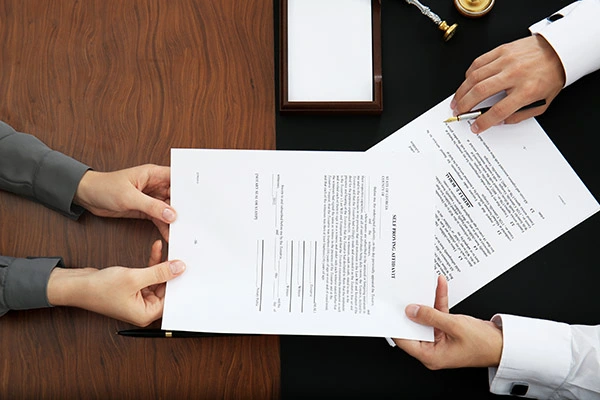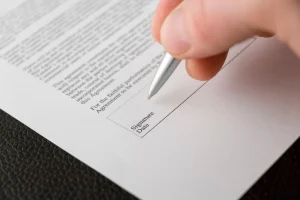Securing Proof of Property Ownership: Owning property in Nigeria is a significant milestone, but it requires you to be careful with legal and procedural steps. Unfortunately, many people make mistakes during this process, which leads to complications, disputes, or even loss of ownership rights.
Walk with us as we highlight the top mistakes people make when securing proof of property ownership in Nigeria and how to avoid them.
READ ALSO:
- How Power of Attorney Works as Proof of Ownership
- How to Register Your Land Title for Proof of Ownership
- Challenges in Establishing Proof of Land Ownership
- Proof of Ownership for Inherited Property in Nigeria
- Court Judgments as Proof of Ownership in Nigeria
Top Mistakes People Make When Securing Proof of Property Ownership
Below are the top mistakes people make when getting proof of property ownership:
1. Failing to Conduct Proper Due Diligence
This is one of the mistakes people make when securing proof of property ownership. Before purchasing property, it is important to verify its ownership and status. A failure to perform adequate checks can result in purchasing disputed or encumbered property.
Common Oversights:
- Not verifying the title documents with relevant authorities.
- Ignoring the property’s legal and physical status (e.g., litigation, encroachments).
How to Avoid:
- Conduct a search at the Land Registry in the state where the property is located.
- Hire a qualified surveyor to confirm the property boundaries and ascertain if there are any encroachments.
2. Not Engaging a Competent Lawyer
Many people attempt to handle property transactions without legal representation, thinking they can save money. This is a common mistake that can lead to significant losses.
Risks Involved:
- Incomplete documentation.
- Overlooking legal issues in the transaction.
- Falling victim to fraudulent sellers.
How to Avoid:
- Hire a lawyer experienced in real estate law to guide you through the process.
- Ensure the lawyer conducts due diligence on the property and drafts or reviews all agreements.
3. Ignoring Land Use Regulations
Each state in Nigeria has specific laws governing land use, which many buyers neglect to consider. Violating these regulations can result in property seizure or inability to develop the land.
Key Errors:
- Buying land zoned for purposes other than intended use.
- Failing to check if the property falls under government acquisition.
How to Avoid:
- Check the Urban and Regional Planning Law in the property’s location.
- Request a Certificate of Occupancy (C of O) or other relevant documentation from the seller.
4. Overlooking the Need for a Survey Plan
This is another mistake people make when securing proof of property ownership. A survey plan is critical for identifying the exact boundaries of the property. Many people fail to demand this document, leading to boundary disputes or overlapping claims.
Common Issues:
- Incomplete or fraudulent survey plans.
- Buying land without clear demarcation.
How to Avoid:
- Engage a licensed surveyor to prepare a survey plan.
- Verify the survey plan at the Surveyor-General’s Office.
5. Assuming Family Land Transactions Are Simple
Family land transactions often involve multiple family members, each of whom may claim a stake. Assuming these transactions are straightforward can lead to significant challenges.
Potential Problems:
- Lack of unanimous agreement among family members.
- Unauthorized sale by a single family member.
How to Avoid:
- Insist on a family resolution document signed by all members of the family.
- Ensure that the transaction is witnessed by community elders or family representatives.
6. Relying on Verbal Agreements
This is also one of the mistakes people make when securing proof of property ownership. Verbal agreements, though sometimes culturally accepted, are legally unenforceable in Nigerian property transactions.
Why This Is Risky:
- Lack of proof in case of disputes.
- Misunderstandings about terms of the agreement.
How to Avoid:
- Always document agreements in writing.
- Ensure all parties sign the documents in the presence of a lawyer or notary public.
7. Failure to Verify Seller’s Identity
Many buyers fail to confirm that the seller is the rightful owner of the property or has the authority to sell it.
Common Red Flags:
- Sellers using fake identities or documents.
- Sellers without legal rights to transfer ownership.
How to Avoid:
- Request and verify the seller’s valid identification and title documents.
- Conduct a background check on the seller through local authorities or community leaders.
8. Skipping the Land Registry Verification
The Land Registry is the official repository of land records in Nigeria. Skipping this crucial step is a grave mistake.
Consequences:
- Buying property with encumbrances or disputes.
- Discovering the land is already sold to someone else.
How to Avoid:
- Conduct a thorough search at the Land Registry to verify ownership and encumbrances.
- Obtain a certified true copy of the property’s title documents.
9. Failing to Obtain a Deed of Assignment
Failing to obtain a deed of assignment is another mistake people make when securing proof of property ownership. A Deed of Assignment is a vital document that transfers ownership of the property from the seller to the buyer. Many people overlook this document, jeopardizing their ownership rights.
Key Risks:
- Legal challenges in proving ownership.
- Issues during resale or transfer of ownership.
How to Avoid:
- Ensure the seller prepares and signs a Deed of Assignment.
- Register the deed at the appropriate Land Registry.
10. Underestimating the Importance of a Certificate of Occupancy
The Certificate of Occupancy (C of O) is an official document issued by the government, granting land use rights for 99 years. Ignoring its importance is a common pitfall.
Why It’s Crucial:
- Confirms the legitimacy of the property.
- Protects against government acquisition.
How to Avoid:
- Verify the C of O for the property before purchase.
- If it does not exist, confirm the seller’s claim to the property through other legal documents.
11. Neglecting Community Consent
In many parts of Nigeria, community or traditional authority consent is required to validate a property transaction. Ignoring this can lead to disputes or nullification of the sale.
Common Mistakes:
- Not obtaining consent from community leaders.
- Disregarding traditional land ownership systems.
How to Avoid:
- Seek approval from community elders or chiefs.
- Get a written acknowledgment of the transaction from relevant traditional authorities.
12. Ignoring Tenancy or Occupancy Issues
Ignoring tenancy or occupancy issues is another mistake people make when securing proof of property ownership. Purchasing property with existing tenants or occupants without proper documentation can lead to legal battles.
Key Problems:
- Difficulty in evicting tenants.
- Disputes over property rights with squatters.
How to Avoid:
- Confirm the status of occupants before purchase.
- Ensure proper legal processes for vacant possession are followed.
13. Misunderstanding Land Title Classifications
Nigeria has various land title classifications, such as freehold, leasehold, and government acquisition. Misinterpreting these classifications can lead to loss of ownership.
Common Errors:
- Buying land under government acquisition.
- Misunderstanding the limitations of leasehold titles.
How to Avoid:
- Familiarize yourself with land title classifications.
- Consult a real estate lawyer to clarify the title type before purchase.
14. Delaying Documentation and Registration
Delaying documentation is another mistake people make when securing proof of property ownership. Procrastination in registering property documents can lead to legal complications, including disputes or loss of ownership.
Risks Involved:
- Difficulty proving ownership in court.
- Exposure to fraud or forgery.
How to Avoid:
- Register all property documents promptly at the Land Registry.
- Keep originals and certified copies in a safe place.
15. Overlooking Tax Obligations
Property transactions in Nigeria are subject to taxes such as stamp duties and capital gains tax. Ignoring these can lead to penalties or legal issues.
Common Mistakes:
- Not paying stamp duties on agreements.
- Failing to pay capital gains tax after selling property.
How to Avoid:
- Engage a tax consultant to calculate and remit necessary taxes.
- Obtain tax clearance certificates for the property.
16. Falling Victim to Fraudulent Agents or Middlemen
This is another mistake people make when securing proof of property ownership. Relying on unverified agents or middlemen often leads to scams or fraudulent transactions.
Typical Scenarios:
- Agents selling non-existent properties.
- Inflating property prices to pocket extra profits.
How to Avoid:
- Deal directly with property owners or registered real estate firms.
- Verify the agent’s credentials and request references.
17. Overlooking Environmental and Zoning Laws
Ignoring environmental regulations can result in fines, demolition, or inability to use the property as intended.
Key Oversights:
- Building on land reserved for agriculture or green spaces.
- Failing to conduct an Environmental Impact Assessment (EIA).
How to Avoid:
- Confirm the property’s zoning status with local authorities.
- Conduct an EIA if required by law.
18. Assuming All Properties Are Free from Encumbrances
Assuming all properties are free from encumbrances is another mistake people make when securing proof of property ownership.
Properties in Nigeria may have legal or financial encumbrances, such as unpaid loans or liens, that transfer to the buyer if not resolved.
Potential Risks:
- Inheriting debts tied to the property.
- Legal battles with creditors.
How to Avoid:
- Conduct a search at the Land Registry for encumbrances.
- Insist on a letter of indemnity from the seller.
Securing proof of property ownership in Nigeria is a detailed process that requires caution and adherence to legal procedures. By avoiding the common mistakes outlined above, you can ensure a smooth transaction and safeguard your investment.
Always prioritize due diligence, legal representation, and proper documentation to minimize risks.




